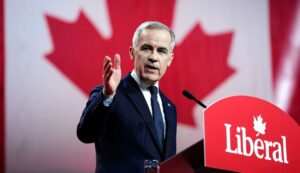Prime Minister Mark Carney: Long-standing economic and security relationship between Canada and the US is over
Ottawa: In response to US President Donald Trump’s announcement of new auto tariffs that could have a significant negative impact on Canada’s economy, Prime Minister Mark Carney announced Thursday that the long-standing economic and security relationship between Canada and the United States has ended, marking a dramatic change in Canada’s foreign policy, according to Politico.

Following his departure from the federal campaign trail in reaction to Trump’s most recent threats, Carney said on Parliament Hill that “the old relationship we had with the United States, based on deepening integration of our economies and tight security and military cooperation, is over.”
Trump said on Wednesday that his government will levy a 25 percent tax on automobile imports from South Korea, Japan, the European Union, and Canada. Additionally, he threatened to impose more tariffs on important US trade partners.
Carney responded by saying he will talk to Trump in the next few days, but he was very clear that any conversation had to respect Canada’s sovereignty. “We need to radically rethink our economy. We’ll have to make sure Canada can thrive in a very different world,” he said.
When Carney returned to Ottawa, he called a meeting of his Cabinet’s Canada-US relations committee. Although it hasn’t disclosed any concrete countermeasures, Canada has said that it is prepared to strike back. Carney said, “We are facing a comprehensive and broad negotiation,” and he would refrain from revealing Canada’s response plan too soon.
The head of the Automotive Parts Manufacturers Association of Canada, Flavio Volpe, issued a warning that the car industry in both nations would be paralyzed in a week if the tariffs were to go through. “You have one, two, or three days to hope the president will be lenient. You have a fiduciary duty to shareholders, and your publicly listed company’s share price is declining,” Volpe told Politico.
US Commerce Secretary Howard Lutnick and Ontario Premier Doug Ford discussed the possible effects on his jurisdiction on Wednesday.
Lutnick clarified that tariffs on automobiles from Mexico and Canada will be modified according to US content, according to Ford. For instance, the tariff rate would be lowered to 12.5% from the full 25% if a vehicle manufactured in Mexico used 50% American components.
“He is promising us that no plants would be shut down. Ford’s reaction was the same as Ronald Reagan’s: “Believe but double-check.” “If they’re opening or closing, it’s going to be up to the CEOs.”
Additionally, Ford said that he had a conversation with Carney and that both parties had agreed that Canada would completely react if needed. Ottawa has already threatened to levy counter-tariffs on US products worth up to CAD 155 billion.
In his early Thursday response on Truth Social, Trump threatened to impose further, more severe trade restrictions if Canada and the EU banded together to oppose the tariffs. “If the European Union works with Canada in order to do economic harm to the USA, large-scale Tariffs, far larger than currently planned, will be placed on them both in order to protect the best friend that each of those two countries has ever had!” Trump wrote.
Carney said Canada will act in its own national interest and rejected Trump’s threat. “It is evident that Canadians possess both agency and power. “We are in charge of our own house,” he said. “We can control our destiny.”
Carney has not had a direct conversation with Trump since taking over as head of the Liberal Party on March 9. He said he has no imminent plans to visit Washington, but members of his Cabinet may. Volpe said a phone conversation would be better than a face-to-face meeting.
Referring to the way the Biden administration has treated Ukraine’s leader, Volpe said, “I don’t think it’s in anybody’s interest in Canada to get Zelenskyy-ed.” ” They have shown that they lack the dignity to pay any respect to an ally whose people are dying. We would probably be taking that chance as well.
Additionally, he suggested that Canada exercise patience and wait for the US economy to recover. “What if everything closes down on the other side and 950,000 American car workers are left idle?” That’s hopeful, but it’s ugly,” Volpe said. “People are going to have to listen to that whole group, and they won’t discuss the cost of eggs. The topic of how to earn rent will be discussed.
The head of Unifor, the biggest private sector union in Canada, Lana Payne, urged the government to defend auto workers and cautioned the US against attempting to move production south while still having access to the Canadian market. “If you think you can shift production, factories, and mills and reinvest in the United States out of Canada and think that you’re going to have open access to our market, you need to think again,” Payne said.
Concerns have also been expressed by premiers of Canada. The problem is that Donald Trump is attempting to sow doubt everywhere, even in Canada. “And he’s attempting to incite panic in order to secure a deal that exploits us,” said Premier Wab Kinew of Manitoba.
Although he conceded that it would not be feasible under Trump, Quebec Premier Francois Legault called for an urgent revision of the United States-Canada-Mexico Agreement (USMCA). “It has to happen as soon as possible because right now, we cannot start negotiating piece by piece a new agreement,” Legault said. However, we must exercise realism. Is Mr. Trump amenable to this discussion?
Under trade deals that Trump renegotiated during his first term, Mexico, Canada, and South Korea presently enjoy duty-free access to the US car market. But according to Politico, the additional tariffs have the potential to seriously upset the interconnected auto supply chains in North America.
At a trade conference scheduled for Friday in Washington, US, Canadian, and Mexican mayors will push for tariff relief.
The Canadian Chamber of Commerce’s president and CEO, Candace Laing, criticized the tariffs as a rash economic decision that would result in the loss of thousands of jobs in both nations. She cautioned that Trump’s tariffs would dramatically raise the cost of automobiles, pointing out that the Ontario-Michigan supply chain alone produces over 25% of all cars in North America. “Under Trump’s tariffs, the cost of a pickup truck would rise by USD 8,000,” she said.
In 2024, the United States imported passenger automobiles valued at USD 214 billion, according to figures from the US Commerce Department. According to the US government, the additional tariffs will go into force one week from now, on April 3.





